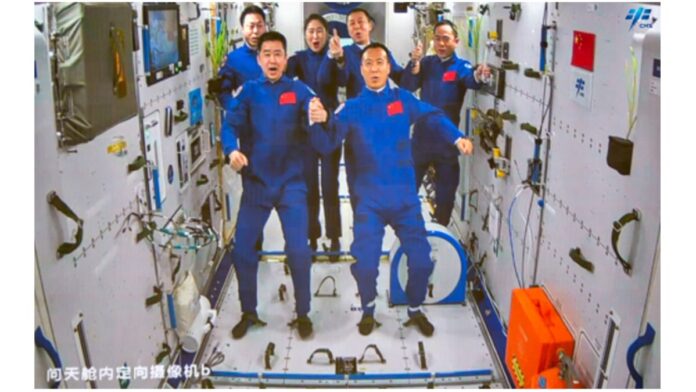A European visit to China’s off-Earth outpost is no longer in the cards, at least in the relatively near future.
The European Space Agency (ESA) had been preparing its astronauts for possible missions to China’s three-module Tiangong space station. In August 2017, for example, ESA’s Samantha Cristoforetti and Matthias Maurer conducted nine days of survival training with 16 of their Chinese counterparts in the Yellow Sea, near the coastal city of Yantai.
And, in the previous year, Chinese astronaut Ye Guangfu took part in ESA’s caving course on the Italian island of Sardinia.
“Both activities stem from the 2015 agreement to boost collaboration between ESA and the China Manned Space Agency, with the goal of flying European astronauts on the Chinese space station from 2022,” ESA officials wrote in a 2017 press release (opens in new tab).
Related: The latest news about China’s space program
Europe has not yet sent any astronauts to Tiangong — and it apparently won’t be doing so anytime soon, according to SpaceNews.
“We are very busy supporting and ensuring our commitments and activities on the International Space Station, where we have a number of international partners working together,” ESA Director General Josef Aschbacher said in a press briefing last week, Andrew Jones reported in a story that SpaceNews published on Jan. 25 (opens in new tab).
“For the moment, we have neither the budgetary nor the political, let’s say, green light or intention to engage in a second space station — that is, participating on the Chinese space station,” Aschbacher said, according to Jones.
China began building Tiangong in April 2021 with the launch of Tianhe, the station’s core module. A side module called Wentian went up last July, and assembly of the T-shaped Tiangong wrapped up with the arrival of the Mengtian module in October.
Tiangong has hosted four crewed missions to date, each of which carried three astronauts to the orbiting complex. All of these visitors have been members of China’s People’s Liberation Army Astronaut Corps.
Despite Aschbacher’s recent statements, a European visit to Tiangong is still more likely than an American trip there. In 2011, Congress prohibited NASA from cooperating substantially with its Chinese counterpart without express prior authorization. This law, known as the Wolf Amendment, makes it very difficult for China to participate in the International Space Station (ISS) program, if the nation even wishes to do so.
China is not an ISS partner, and no Chinese astronaut has ever visited the venerable outpost.
Mike Wall is the author of “Out There (opens in new tab)” (Grand Central Publishing, 2018; illustrated by Karl Tate), a book about the search for alien life. Follow him on Twitter @michaeldwall (opens in new tab). Follow us on Twitter @Spacedotcom (opens in new tab) or on Facebook (opens in new tab).

